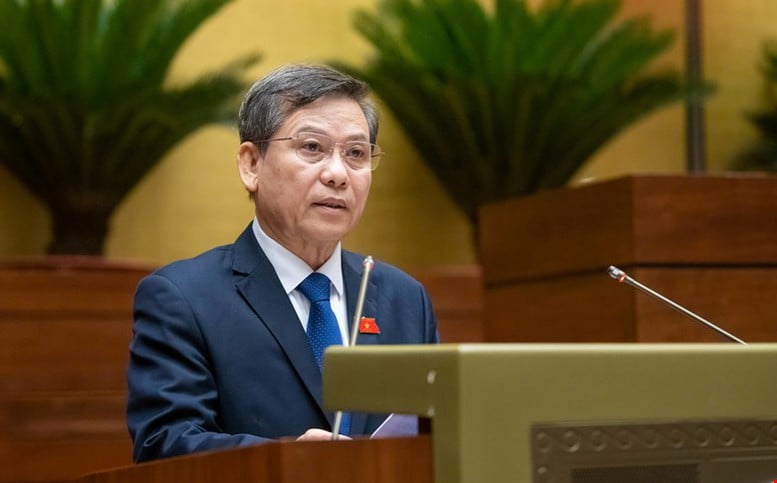
Chief Justice of the Supreme People's Court Le Minh Tri presented the draft Law.
Continuing the agenda of the 9th session, the National Assembly heard the presentation of the draft Law amending and supplementing a number of articles of the Law on the Organization of People's Courts and the report on the review of the draft Law amending and supplementing a number of articles of the Law on the Organization of People's Courts.
Presenting the report, Chief Justice of the Supreme People's Court Le Minh Tri emphasized that the draft Law has amended and supplemented regulations on the organization of the court system in the direction of ending the operation of the High People's Court and the District People's Court; establishing regional People's Courts; and transforming specialized first-instance People's Courts into specialized courts within the regional People's Courts.
Accordingly, the organizational model of the court system includes: the Supreme People's Court; the People's Courts of provinces and centrally-administered cities; and the People's Courts of regions (amending Article 4 of the Law on Organization of People's Courts in 2024).
Specifically, regarding the duties, powers, and organizational structure of regional People's Courts, the People's Courts of districts, towns, and cities under provinces and centrally-administered cities will be restructured into regional People's Courts.
Amend and supplement regulations on the organizational structure of regional People's Courts, stipulating that regional People's Courts include specialized courts such as: Criminal Court, Civil Court, Administrative Court, Economic Court, and Family and Juvenile Court.
The regulations stipulate that some regional People's Courts will have Bankruptcy Courts and Intellectual Property Courts, with the territorial jurisdiction of these specialized courts determined by the Standing Committee of the National Assembly. The Supreme People's Court plans to establish three Bankruptcy Courts in three regional People's Courts in Hanoi, Da Nang, and Ho Chi Minh City; and two Intellectual Property Courts in two regional People's Courts in Hanoi and Ho Chi Minh City.
Establishing specialized courts for bankruptcy and intellectual property in several regional people's courts in major provinces and cities that are economic and financial centers of the country is necessary to improve the quality of resolving and adjudicating these types of cases; at the same time, to realize Vietnam's commitment and affirm its determination to seriously enforce intellectual property rights, improve the investment and business environment, and strongly attract foreign investment to the international community. The establishment of these specialized courts for bankruptcy and intellectual property does not create additional administrative layers, increase staffing, or require additional office space.
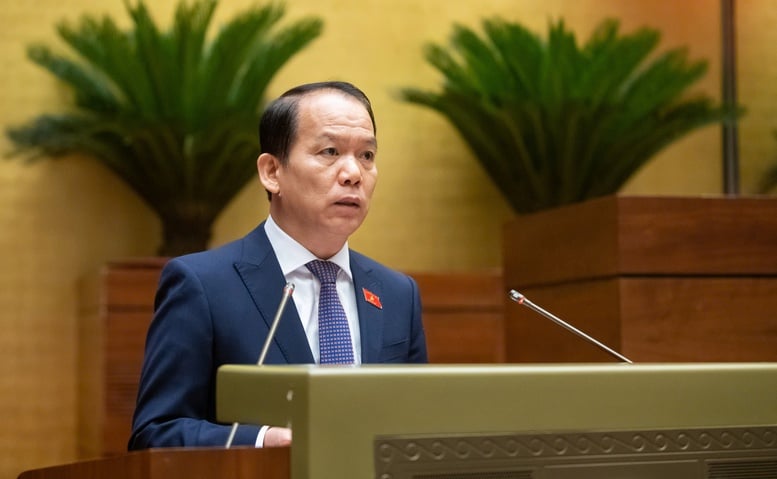
Chairman of the Committee on Law and Justice Hoang Thanh Tung presented the report on the review of the draft law.
Increase the number of Supreme Court judges to 23 to 27.
The report on the draft Law, presented by the Chairman of the National Assembly's Committee on Law and Justice, Hoang Thanh Tung, clearly states that the Committee agrees with the necessity of amending and supplementing several articles of the Law on the Organization of the People's Courts. The content of the draft Law is consistent with the Party's guidelines and policies; ensuring constitutionality and uniformity with the legal system.
The scope of the amendments and additions focuses on regulations related to the reorganization and streamlining of the organizational structure and the tasks and powers of the People's Courts according to the three-tiered organizational model.
The Committee approved the regulations on the organization of the People's Courts, including the Supreme People's Court, provincial-level People's Courts, and regional People's Courts. (Military Courts remain unchanged according to current law). The High People's Court and district-level People's Courts ceased operations.
The Committee basically agreed on the redefinance of the tasks and powers of each level of the Court, specifically: the Supreme People's Court is assigned the additional task of hearing appeals in criminal cases where judgments and decisions of provincial People's Courts have not yet become legally effective and are being appealed or challenged; and conducting supervisory review and retrial of judgments and decisions of provincial People's Courts that have become legally effective and are being challenged (these two tasks are inherited from the High People's Court).
Provincial People's Courts are responsible for the first-instance trial of criminal cases as prescribed by law; the appellate review of all judgments and decisions of regional People's Courts that have not yet become legally effective and are appealed or challenged; and the supervisory review and retrial of judgments and decisions of regional People's Courts that have become legally effective and are challenged (this task is inherited from the High People's Court).
The regional People's Court hears criminal cases at first instance as prescribed by law; it also hears all civil and administrative cases and resolves other matters within its jurisdiction.
The amendments and adjustments to the duties and powers of the People's Courts mentioned above are in line with the policy of strengthening decentralization and delegation of power; are consistent with the existing organizational structure, resources, and ability to fulfill assigned tasks; and ensure the normal and uninterrupted operation of the three levels of People's Courts.
The Committee approved the establishment of Appellate Courts of the Supreme People's Court to carry out the newly assigned task of hearing appeals against criminal judgments and decisions of provincial-level People's Courts that have not yet become legally effective.
We basically agree with the proposal of the submitting agency regarding the establishment of Economic Courts at regional People's Courts; Intellectual Property Courts, and Bankruptcy Courts at some regional People's Courts in major provinces and cities that are economic and financial centers of the country, in order to meet the requirements of practical needs and international integration, as disputes in business, trade, intellectual property, and bankruptcy resolution are increasingly common and are all difficult and complex cases, requiring officials and judges with in-depth knowledge.
The Committee generally agreed with the proposal to increase the number of Supreme Court judges from 13-17 (as stipulated by current law) to 23-27 to ensure sufficient personnel to handle the newly transferred supervisory review and retrial tasks from the High People's Court, guaranteeing the quality and timeliness of the trials.
The Committee generally agrees with the amendment and supplementation of regulations on the conditions for expanding the pool of candidates for appointment as Supreme Court Judges in special cases decided by competent authorities. Accordingly, the proposed candidates must currently be Supreme Court Judges, have at least 5 years of experience as a Director of a specialized professional department at the Supreme Court, and the number of people proposed for appointment under this regulation shall not exceed 10% of the total number of Supreme Court Judges.
This regulation is necessary to build a team of Supreme People's Court judges who are highly skilled in their profession, possess strong political convictions, ethical qualities, professional responsibility, impartiality, and professionalism to meet the requirements of the new situation as outlined in Resolution 27-NQ/TW.
Thu Giang
Source: https://baochinhphu.vn/de-xuat-thanh-lap-toa-an-nhan-dan-khu-vuc-toa-chuyen-trach-ve-pha-san-so-huu-tri-tue-102250508092400298.htm


![[Image] Leaked images ahead of the 2025 Community Action Awards gala.](/_next/image?url=https%3A%2F%2Fvphoto.vietnam.vn%2Fthumb%2F1200x675%2Fvietnam%2Fresource%2FIMAGE%2F2025%2F12%2F16%2F1765882828720_ndo_br_thiet-ke-chua-co-ten-45-png.webp&w=3840&q=75)
![[Photo] Prime Minister Pham Minh Chinh receives Lao Minister of Education and Sports Thongsalith Mangnormek](/_next/image?url=https%3A%2F%2Fvphoto.vietnam.vn%2Fthumb%2F1200x675%2Fvietnam%2Fresource%2FIMAGE%2F2025%2F12%2F16%2F1765876834721_dsc-7519-jpg.webp&w=3840&q=75)
![[Photo] Prime Minister Pham Minh Chinh receives the Governor of Tochigi Province (Japan)](/_next/image?url=https%3A%2F%2Fvphoto.vietnam.vn%2Fthumb%2F1200x675%2Fvietnam%2Fresource%2FIMAGE%2F2025%2F12%2F16%2F1765892133176_dsc-8082-6425-jpg.webp&w=3840&q=75)

![[Live] 2025 Community Action Awards Gala](/_next/image?url=https%3A%2F%2Fvphoto.vietnam.vn%2Fthumb%2F1200x675%2Fvietnam%2Fresource%2FIMAGE%2F2025%2F12%2F16%2F1765899631650_ndo_tr_z7334013144784-9f9fe10a6d63584c85aff40f2957c250-jpg.webp&w=3840&q=75)
























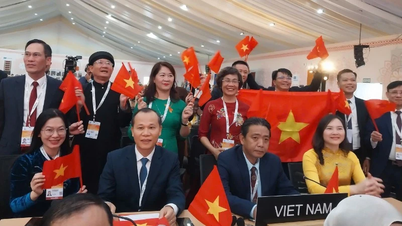






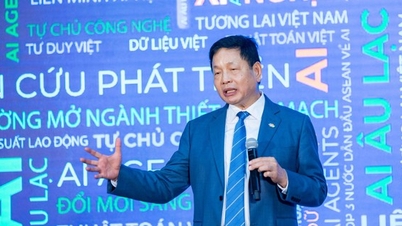

























![[Photo] Prime Minister Pham Minh Chinh attends the Vietnam Economic Forum 2025](https://vphoto.vietnam.vn/thumb/402x226/vietnam/resource/IMAGE/2025/12/16/1765893035503_ndo_br_dsc-8043-jpg.webp)



































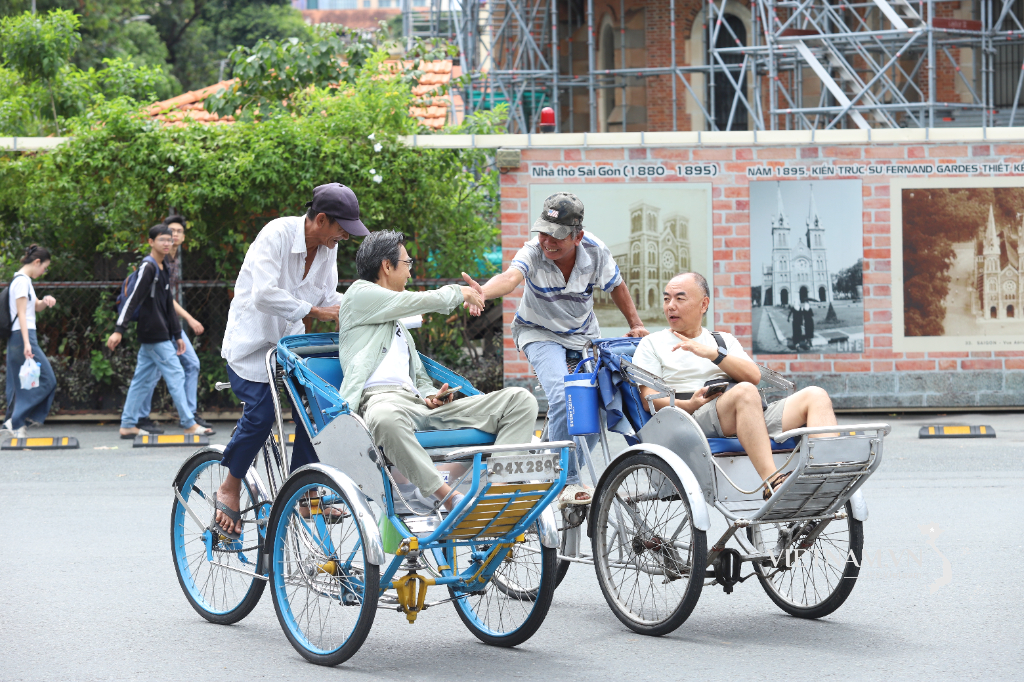


Comment (0)